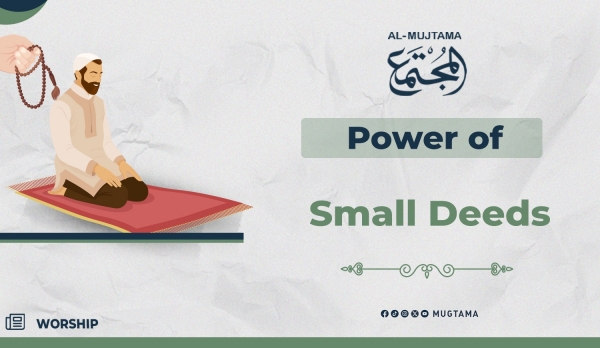A Muslim in London recounts: After Friday prayer, I noticed some safety cones had fallen into the road. Cyclists were swerving to avoid them, and people were walking past indifferently. So I went over and put them back in place. I didn’t realize that a man walking behind me had noticed what I did. He came over to help, smiled at me, and we began talking. He said to me, “Do you know that my entire family embraced Islam because of a simple act like that?”
He told me how his father used to see a Muslim man and his son rearranging the cones every day in their neighborhood. When he asked them why, the man replied, “Removing harm from the road is a form of charity,” as his religion, Islam, had taught him. That was the beginning of their acquaintance, which eventually led to his and his whole family's conversion to Islam!
Such a small act changed the life of an entire family!
But why?
It wasn’t merely the act of removing harm from the road that touched this man’s heart, but the fact that an entire religion encourages such small details in a society burdened by individualism, where everyone is solely focused on themselves and pays no attention to the welfare of others.
A field study conducted in France in 2002 by researchers Peggy Chekroun and Markus Brauer demonstrated that the presence of others significantly reduces the likelihood that an individual will intervene when witnessing antisocial behavior such as littering or vandalism. The researchers observed that people’s reactions to norm violations are largely shaped by their sense of personal involvement. If individuals do not feel personally affected by the behavior, they tend to assume that someone else will intervene, a phenomenon known as the bystander effect, which often results in no one taking action at all.
Amid the growing trend of individualism in Western societies, loneliness and social isolation have become widespread phenomena, threatening the wellbeing of both individuals and communities. A large-scale study involving over 46,000 participants from 237 countries, conducted as part of the BBC Loneliness Experiment, found that feelings of loneliness are significantly more prevalent in individualistic cultures—particularly among young adult males. These feelings are strongly associated with a higher risk of depression, various mental health disorders, and even premature death, with some estimates suggesting an increased mortality risk of up to 50%. This is largely a result of encouraging people to detach from their social environments in favor of personal independence.
Islam’s Comprehensiveness
In the midst of this disconnection and detachment from communal values, Islam came to affirm both the rights of the individual and the framework in which they live. It not only focuses on the individual’s rights but also strongly emphasizes their responsibilities toward the society in which they live. Islam does not separate the individual from the community; rather, it sees the success and elevation of society as tied to the success of the individual, and vice versa. This is a value that Islam instills in Muslims and links to success both in this world and the Hereafter. Abu Huraira (may Allah be pleased with him) narrated that the Messenger of Allah ﷺ said: “Faith has over seventy branches or over sixty branches, the most excellent of which is the declaration that there is no god but Allah, and the humblest of which is the, removal of what is injurious from the path” [Reported by Muslim] Notice how Islam links a person’s belief with civil, beneficial behavior. In this way, a Muslim grows up feeling connected to his people and community, completely shedding the destructive tendency of individualism.
The Prophet ﷺ also said: “I have seen a man going about in paradise as a reward for cutting down a tree which was overhanging a road and annoying people.” [Reported by Muslim] And he said: “Removing a harmful object from the road is a charity.” [Agreed upon]
Thus, the Prophet ﷺ places responsibility for society on every individual. No one should sit idle and wait for others to take actions. Rather, every person begins with themselves, seeking the reward of Allah the Almighty. In turn, their acts of worship benefit both themselves and the Muslim community at large.
On the other hand, Allah warns against causing harm to others:
“And those who harm believing men and believing women for [something] other than what they have earned have certainly born upon themselves a slander and manifest sin.” (Al-Ahzab: 58) And the Prophet ﷺ also warned: “Safeguard yourselves from the two matters which cause accursing that befalls the one who relieves himself on people’s path-ways and under the shades.” [Reported by Muslim]
This is how Islam surpasses other religions: a simple scene such as removing a stone from the road becomes, in Islam, a path to Paradise. Meanwhile, harming an animal or a human being may become a cause for entering Hellfire. A nation raised on this principle becomes more merciful and more eager to serve the greater good.
Providing Water as the Best Charity
-------------------------------------------------------
- Islamweb
- Islamway
- Alukah.net
